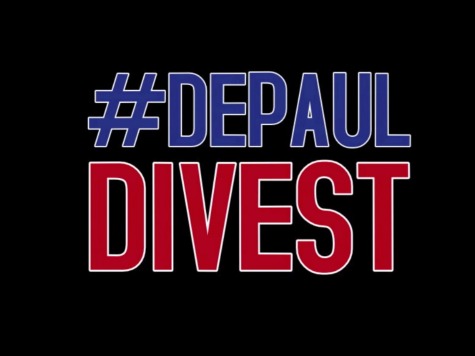With approximately 10 percent of the DePaul University student body participating in last week’s anti-Israel divestment referendum vote, apathy appears to be the big winner on the Lincoln Park campus. Still, by a vote of 54 percent to 46 percent (1,575 to 1,333), the “DePaul Divests” referendum, an initiative of Students for Justice in Palestine (SJP), has passed.
“Following two months of campaigning at DePaul University, student coalition DePaul Divest declares victory in a campaign to divest from corporations that profit off of human rights violations perpetrated against Palestinians via the illegal Israeli occupation of Palestine,” according to SJP’s press release.
But divestment supporters’ victory celebration was short-lived, as DePaul University President Rev. Dennis H. Holtschneider, C.M., issued a public statement explaining the complexities of the measure and the financial impact it could have on students.
Students have asked questions about our investments. These are the scholarship funds that generate earnings that can then be distributed to students to help them afford their education. Our students rely on these funds a great deal. In 2008, when the markets dropped precipitously, DePaul had less to give to students and, tragically, some students had to leave the university while others could not accept our admission invitations.
As for this specific referendum, I have previously made clear that university policy is not set by referendum and that the Fair Business Practices Committee is the appropriate university body to study and make a recommendation on this issue. I will recommend it for their fall agenda. This committee was established in 2000 and is comprised of faculty, staff and student representatives. I therefore encourage supporters of the referendum to present their case to the committee and encourage all other interested parties to do the same.
Both sides of the referendum have responded to the statement.
Leila Abdul Razzaq, president of Students for Justice in Palestine at DePaul, took Holtschneider’s letter to mean that he was taking the group’s concerns seriously. But, as reported in the Chicago Tribune, she was “disappointed in the reluctance of university leaders to take a stronger stance.”
Cameron Erickson, one of the student leaders of Blue Demons Against BDS, said, “The university president’s statement was fair and honest and explains why we need more conversation about the issue, not less.”
In an earlier interview, Erickson expressed disappointment that the pro-divestment students refused to have an open and honest debate about the issue.
“We’ve tried reaching out to DePaul Divests and tried to dialogue with them, they’ve turned us down flat, said they are not interested in talking to us,” Erickson added. “While we want dialogue and we want self-determination for all people, they’re really just not interested in that conversation.”
A debate scheduled for this past Friday turned into a one-sided forum, as DePaul Divests did not respond to the invitation.
On May 21 via email, this writer asked DePaul SJP Treasurer Hanna (last name withheld), “Do you believe there has been an open and honest dialogue going on in regard to the divestment campaign? Was there a reason why your coalition did not accept the debate invitation from Professor Callahan?”
There has been no response to my email as of yet.
On Friday, Erickson’s organization submitted complaints to the SGA Elections Operation Board (EOB) regarding the language used to describe the referendum as well as alleged campaign violations committed by DePaul Divests supporters.
To Erickson’s surprise, they received a response from Sarah Rens, Vice President of DePaul University Student Government Association, on Memorial Day morning that read, “Your complaints were reviewed and SGA’s Judicial Board determined that the referendum result is going to stand. I encourage you to continue working with the Dean of Students office to address your concerns about student conduct throughout the week.”
When asked about the decision, Erickson said, “We didn’t even get a hearing. Doesn’t seem like they gave this much evaluation.”
Steven Resnicoff, Professor of Law and Co-Director of DePaul University College of Law Center for Jewish Law and Judaic Studies, stated that “for substantive and professional reasons, DePaul should not implement the student divestment referendum.
“The referendum falsely demonizes and defames Israel, encourages anti-Semitic conduct (including violent anti-Semitic conduct), impedes the peace process, and would unfairly harm Palestinians who are gainfully employed by the very companies targeted by the referendum,” he explained. “Procedurally, the referendum’s narrow victory was the result of the misleading way in which it was worded and presented, the improper and intimidating campaign tactics employed by it supporters, and the fact that large numbers of students (especially law students whose academic term had already ended) were completely unaware of the referendum.”
Resnicoff believes financial pragmatism will be the downfall of the referendum: “Nationwide, colleges and universities are experiencing increasing economic pressures. To alleviate these pressures, and to make education affordable to students, colleges and universities must invest their money productively. DePaul is too small an investor to dictate to the funds that they not invest in particular companies.”

COMMENTS
Please let us know if you're having issues with commenting.